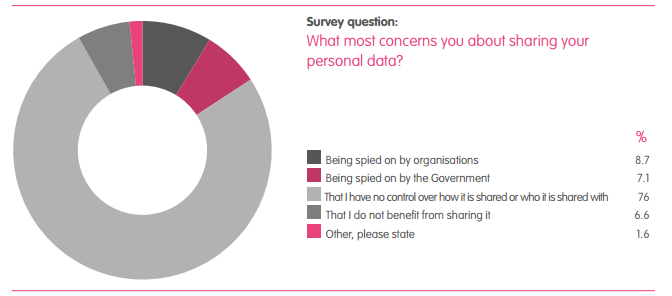By David Howell - October 5th, 2015

Why should consumers want you to have their data?
The high profile security breaches that Scottrade, Experian, and Ashley Madison have suffered continue to highlight the issues with the enormous amounts of personal data that modern corporations collect. Today, data itself is the most precious commodity available to marketers, but consumers are becoming increasingly protective of this information.
With concerns about how companies are using and—more importantly—protecting the personal information of their customers, businesses have to make a strong case to persuade a skeptical public that they can benefit from handing over information about the minutiae of their lives.
Gaining a close personal connection with customers has been a driving force behind marketing for decades, but has taken on a whole new urgency since the inception of social media. These networks offer an opportunity to make intimate connections via a channel that continues to expand.
Consumers have been increasingly asking themselves why they should share personal data with businesses and corporations. Indeed, according to Digital Catapult's Trust in Personal Data report, which focuses on the UK, 60% of consumers are uncomfortable sharing personal data, with 14% refusing to share this information at all. For nearly three-quarters of respondents to the survey, their main concern was lack of control. Over three-quarters were of the opinion that companies used their information for their own monetary gain, and not to improve customer service or personalization.

“The sharing of personal data is vital to the improvement of digital services, and the development of new ones," said Neil Crockett, CEO of the Digital Catapult. "Businesses need and will benefit from consumer data, but the public doesn’t understand why they should share it. To address this, organizations need to be honest, open, and transparent about when and why data is being used.”
What is clear is that value has to be communicated by brands to their customers to illustrate how the exchange of personal information is beneficial to them. The cynical nature of the consumers, particularly when dealing with large corporations, can be reconciled with transparent marketing practices. Often, collecting personal data is done without this transparency, which just fosters higher levels of mistrust.
The Harvard Business Review stated: “Firms looking to stay ahead of privacy concerns should be forthright about how consumer data is being used, and what value is being created — for the firm, for the customer, and for third parties. Most companies already say they are all about their customers, but inherent power asymmetries mean consumers need better assurances and convincing proof.”
Corporations need to manage both the data they collect from their customers, as well as those customers’ expectations. A clear and unambiguous statement of how personal data will be used is all it takes to generate that necessary trust. Consumers understand that to unlock premium services without paying, they need to be willing to exchange information in return.
However, as your corporation’s customers become more discerning about when and where this information is given, only those brands that have communicated their intentions and can show proof will become destination businesses that benefit from consumer advocacy.

Surveillance marketing
The use of social media as a primary channel for gaining consumer data is one area where trust must be maintained. Microsoft, in their research, point to what they call the ‘Sharing Gap’:
“A distinct, measurable divergence between the types of data that they (consumers) consciously share, and the types of data that they believe brands collect anyway. Consumers believe that brands in all categories are collecting more information than they themselves are actually sharing, and the varying sizes of the Sharing Gap reflect the different dynamics involved with different categories, and different data types.”
Microsoft continued: “Consumer attitudes towards sharing are shaped by their awareness and appreciation of different data types and their value, and also their experience in seeing the benefits of data-sharing first hand. However, they are also impacted by the national discourse around privacy and cultural attitudes towards business in their country.”
It is possible to close the Sharing Gap and reducing the resistance to share personal data by following simple rules:
- Data regulation compliance - Check your corporation is fully compliant with data collection regulations and legislation.
- Transparency with data collection and use - It is essential ensure that your business is perceived as a trusted collector of personal data that will be safe and secure.
- Clearly communicate benefit - What will your corporation’s customer receive in return for their personal data? A well-defined exchange of information for benefit must be communicated.
- Develop data policies - Leave your corporation’s customers in no doubt about how you will use the personal data collected. Secrecy breeds mistrust, which will damage reputations and also reduce the quantity and quality of the personal data customers give.
- Long-term value - Businesses need to build relationships with their customers that stretch long into the future. Communicating how personal data will be used to foster these relationships is the key to a long-lasting partnership with customers.
- Complete control - One of key issue that consumers have when sharing their personal data is a sense they are not in control of how it is collected, used and more importantly shared. Relieve this tension by placing customers in complete control of their data.
Brands must ensure that customer data forms a vital component of their marketing strategies, and is collected and used responsibly to ensure high levels of customer trust.
Next Reads
November 2015, The Marriott Brooklyn Bridge
The USA's best brand-focused marketing conference. Featuring CMOs, SVPs and marketing leaders from Dell, Citi, Chobani, Activision, HSBC, Mondelez and many more.
Brochure Programme